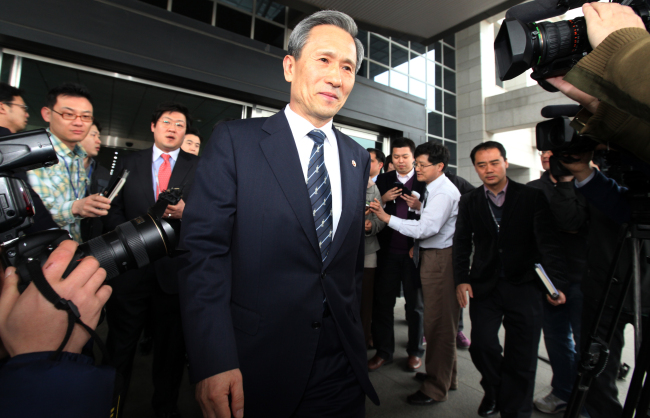Park retains defense minister after nominee quits over ethics
President’s personnel appointment system heavily criticized
By 윤민식Published : March 22, 2013 - 14:04
Incumbent Defense Minister Kim Kwan-jin will stay in office to replace controversy-ridden minister-designate Kim Byung-kwan, who resigned upon spiraling allegations, to lead the nation’s defense at a time of heightened security tension on the Korean Peninsula, Cheong Wa Dae said Friday.
Kim Byung-kwan’s resignation came 38 days after heavy opposition attacks against his alleged irregularities, leaving a sizeable dent on the credibility of President Park Geun-hye’s personnel appointment system.

“At a time of national security crisis amid North Korea’s series of provocations, (the country) was recently hit with a cyber terrorist attack,” Park’s spokeswoman Kim Haing said. “President Park made the decision that the situation was too critical for the security of the country and the people to further delay (the government lineup) with yet another round of political conflicts and confirmation hearings,” she said.
Park believes that by keeping Kim, who has been praised for his clear vision for security and leadership, the government can focus on stabilizing the security situation and alleviating public anxiety.

The Defense Ministry noted that this is the first time in the ministry’s history for its chief to retain his position through the administration change.
Kim Kwan-jin served as the defense chief since December 2010, when the nation was rattled by North Korea’s artillery attack on Yeonpeyong Island near the tense maritime border in the West Sea in the previous month.
He has vowed hard-line retaliation against Pyongyang’s provocation. “For now, I will devote myself to dealing with the current security situation,” Kim told reporters after his appointment. “I will firmly maintain military readiness to be able to retaliate if provoked.”
Kim also reiterated the ministry’s principle to follow through the wartime operational control transfer set for December 2015 as scheduled, but to supplement necessary parts.
The minister is to work alongside Kim Jang-soo, head of the presidential office of national security, and Nam Jae-joon, chief of the National Intelligence Service. All three are graduates of the Korea Military Academy.
Born in Jeonju, North Jeolla Province, Kim served as the commanding general of the 35th Army Division, commander of the 2nd Army Corps and chief director of the JCS Joint Operations Headquarters. He assumed command of the 3rd Army in 2005 and became the 33rd chairman of the JCS in 2006.
Park, later in the day, also confirmed the designations of Deputy Prime Minister for Economy Hyun Oh-seok, NIS chief Nam and Financial Services Commission head Shin Je-yoon.
Kim Byung-kwan, meanwhile, released a short statement announcing his resignation. “I offer to resign from the nomination as defense minister for sake of smooth operation of the government,“ he said. ”I apologize to the people for having caused concerns.”
The disgraced former Army general was accused of involvement in a variety of ethical misdeeds including alleged lobbying for an arms dealing company, real estate speculations, and omitting his possession of shares in a controversial development company, to name a few.
Sources said Cheong Wa Dae, which had been unwaveringly supportive of Kim, began to reconsider the cost of maintaining him at the post as the controversy continued to spill over to the president’s personal appointment system, with even the ruling party lawmakers beginning to voice opposition.
Since January, the opposition and critics have said that more than a handful of President Park’s choices of figures to high public posts have been “dropping like flies” over a variety of reasons, but fundamentally due to her problematic personnel selection and screening systems.
Kim joins five other former nominees including: Prime Minister-nominee Kim Yong-joon and Constitutional Court chief-nominee Dong-heub, who resigned over allegations of ethical misdeeds; Science Minister-designate Kim Jeong-hoon, who left citing Korea’s disappointing political culture as allegations of his private life emerged; Small and Medium Business Administration chief-nominee Hwang Chul-joo over technical misunderstanding of the requirement for public officials to sell off assets related to their duty; and Vice Justice Minister Kim Hak-ui who resigned amid alleged involvement in a sex-for-favors scandal.
Aside from them, five to six other nominees who were originally tapped to join the presidential office as secretaries quit or were replaced without due explanation.
“The people are watching President Park and are frustrated and exhausted at the unexplainable incessant appointment fallouts,” said Democratic United Party spokesman Park Yong-jin.
The resignation of Kim Hak-ui in particular stoked debate that Park’s vetting system had fundamental problems as it was revealed that Cheong Wa Dae had learned of the rumor beforehand but decided to go ahead with the nomination upon Kim’s denial.
The DUP’s interim leader Moon Hee-sang called the string of resignations a “forewarned catastrophe,” and said Park should immediately mobilize the presidential personnel committee so that a proper screening process can take place.
According to a survey conducted by Hangil Research on March 18, only 4.3 percent of the respondents thought the president was doing a good job in naming people to Cheong Wa Dae and the Cabinet.
“A president withdrawing one’s nomination does not mean he or she is succumbing to the public opinion, but that he or she is upholding the (wish) of the people. And such experience can work as a lesson for the president to carry out a wider screening process,” politics professor Shin Yul said in a commentary.
By Lee Joo-hee (jhl@heraldcorp.com)



![[KH Explains] Hyundai Motor’s plan for new landmark keeps hitting bumps](http://res.heraldm.com/phpwas/restmb_idxmake.php?idx=644&simg=/content/image/2024/05/13/20240513050626_0.jpg&u=20240513192803)

![[Grace Kao] American racism against Stray Kids](http://res.heraldm.com/phpwas/restmb_idxmake.php?idx=644&simg=/content/image/2024/05/13/20240513050827_0.jpg&u=)












